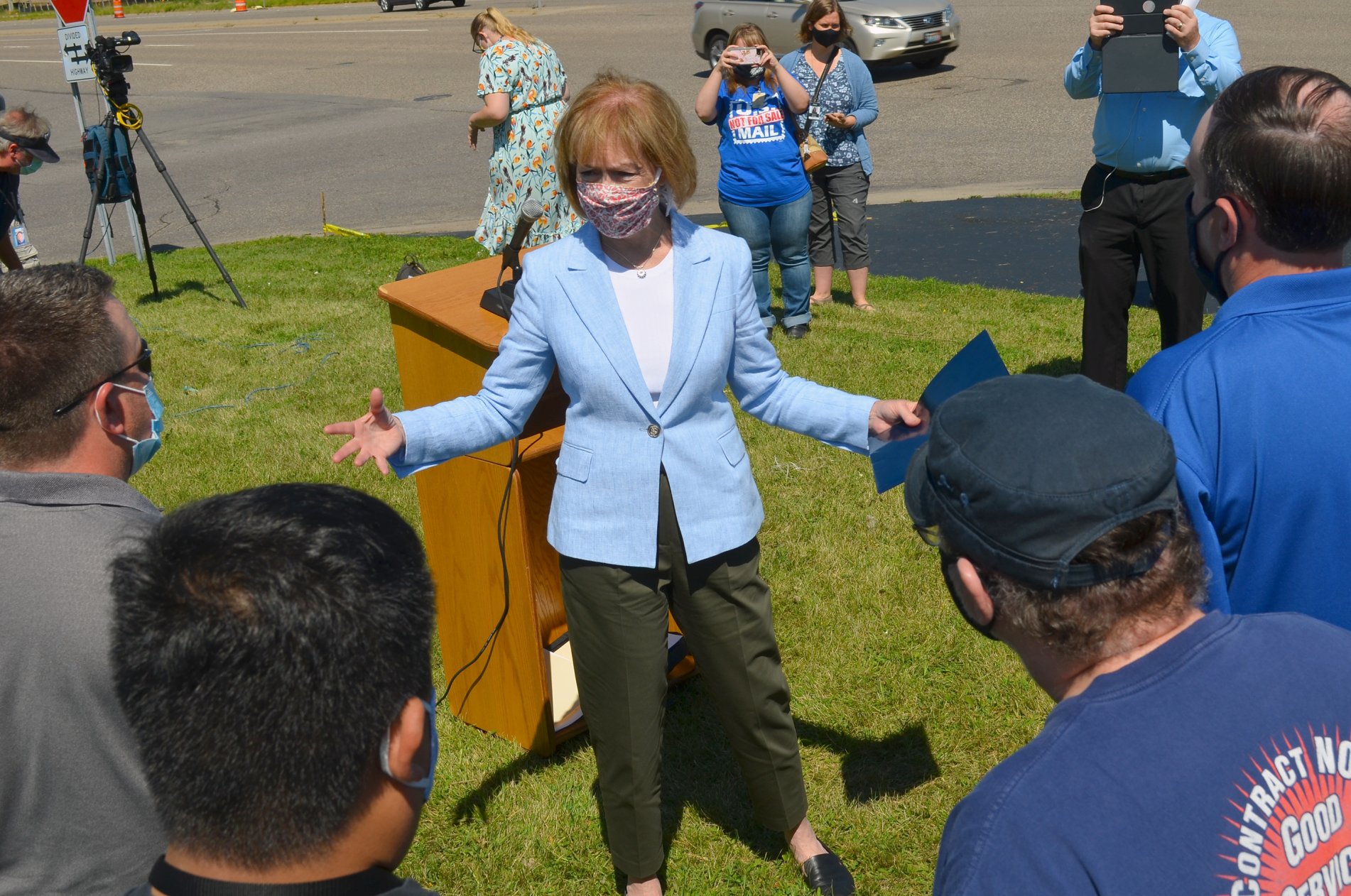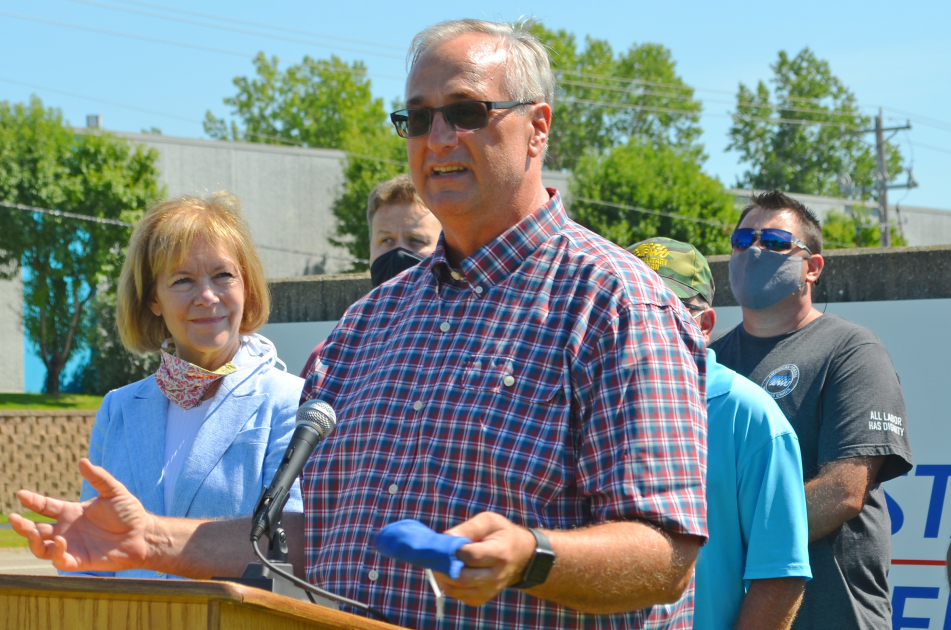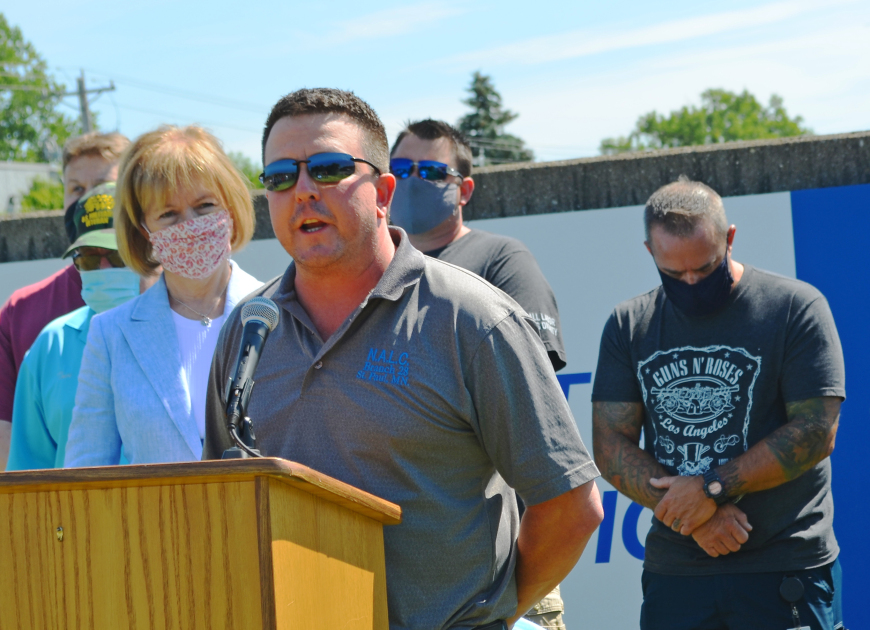
Tina Smith meets with postal employees outside the Eagan distribution center.

Share
As U.S. Sen. Tina Smith met with postal workers, letter carriers and reporters outside the sprawling mail distribution center in Eagan today, a pickup truck exiting the facility slowed to a stop near the crowd. The driver lowered her window and barked out a brief message for Smith before speeding away.
“Thank you, senator!” she yelled. “Give him hell.”
That’s exactly the treatment new Postmaster General Louis DeJoy has received from Smith and other Minnesota DFLers over the last month, as structural changes at the USPS have slowed down mail delivery in many parts of the country and, just 11 weeks from Election Day, cast doubt on the agency’s ability to accommodate a vote-by-mail surge during the COVID-19 pandemic.
“I have been hearing from many, many of my constituents about mail that is late, that is unreliable,” Smith said after an inspection of changes at the Eagan facility. “And that’s not the fault of the people who work so hard inside that building. That is the fault of the chaotic approach and rapid-fire change we’ve been seeing at the federal level.”
In response to criticism from both Democrats and Republicans, DeJoy issued a statement shortly before Smith’s scheduled tour, announcing that the Postal Service would put further restructuring plans on hold through Election Day.
“That doesn’t give me any great confidence,” Smith said, adding that she worries DeJoy shares President Donald Trump’s “politicized” view of the Postal Service. “It makes me wonder what their true intentions are.”
The USPS Board of Governors, stacked with six Trump appointees, tapped DeJoy to serve as postmaster general May 6, and he took office in June.
For DeJoy, who has contributed millions to Republican candidates and over $1.2 million to the Trump Victory Fund, it was his first job with the public Postal Service after a 35-year career in the private shipping industry. He and his wife recently held investments of between $30 and $75 million in companies that compete directly with USPS – a blatant, but not illegal conflict of interest.
Union leaders warned DeJoy’s appointment was like putting a fox in charge of the hen house, and he has done little in the last two months to prove otherwise.
In July, DeJoy announced processing facilities like the one in Eagan would hold onto mail not sorted in time to meet strict distribution schedules, a move he described as necessary to curb overtime pay. Previously, drivers and postal workers would work in tandem to move as much of the day’s mail off the shop floor before closing the truck gate, ensuring timely, dependable delivery.
Todd Elkerton, president of the APWU’s St. Paul branch, speaks during a press conference outside the Eagan facility.
“We were taught if that mail doesn’t go out the next day, we were going to get in trouble,” said Todd Elkerton, president of the American Postal Workers Union in St. Paul. “Now we’re seeing it happen. It’s being directed from above. And we’re really having a hard time dealing with it.”

Meanwhile, the Postal Service has removed 671 sorting machines from stations across the country, leading to further delays. And photos of mailboxes ripped off the streets in several communities spread widely on social media last week, prompting more public outrage.
The Eagan facility has lost seven sorting machines since the restructuring began, Elkerton said. It’s not the first time he has seen machines “tarped” – or taken out of service – during periods of low mail flow, but it is more than Elkerton has ever seen at once.
So far, postal workers in Eagan have been able to keep disruptions in mail service to a minimum. But the facility was understaffed before the restructuring, and the sorting machines Eagan lost were capable of processing nearly 5 million pieces of mail per day. Elkerton and Joe Malkush, president of the National Association of Letter Carriers in St. Paul, said that doesn’t bode well for the inevitable increase in mail volume.
Smith and other federal lawmakers from Minnesota have demanded DeJoy reverse the changes, alarmed by reports from constituents whose medications have been slow to arrive by mail.
Rep. Angie Craig, a DFLer who represents Minnesota’s 2nd Congressional District, sent a letter to DeJoy and Veterans Affairs Secretary Robert Wilkie, Jr., earlier this month, noting that the VA fills nearly 80% of veterans’ prescriptions by mail.
Joe Malkush, president of the St. Paul letter carriers union, say if his members can deliver the mail on time for the holidays, “we can do it during the election.”

“I will not stand by and watch these recent attempts to politicize, dismantle and delay postal services, which put the lives of more than 330,000 veterans every day at unnecessary risk,” Craig said. “The politicization of the Postal Service is a grave disservice to the hardworking employees of the Postal Service and puts American veterans in harm’s way.”
In May, Craig and 4th District Rep. Betty McCollum voted with other House Democrats to keep the agency afloat during the pandemic with $25 billion in emergency funding, part of the HEROES Act. Trump and Senate Republicans have balked at the amount.
The president has acknowledged the emergency funding would improve the agency’s ability to handle mail-in voting, which he opposes. “They need that money in order to have the post office work so it can take all of these millions and millions of ballots,” Trump said in an interview with Fox Business.
Further stoking election-related fears, the Postal Service sent letters to 46 states warning that mail-in ballots may not be delivered in time to be counted. But local postal employees said they remain confident every ballot cast through the mail here will be delivered to election officials on time – “even if we have to go the extra mile,” Elkerton said.
Delivering the mail, Smith quipped to reporters, is embedded in postal employees’ DNA.
“We do it during Christmas,” Malkush added. “We can do it during the election.”

